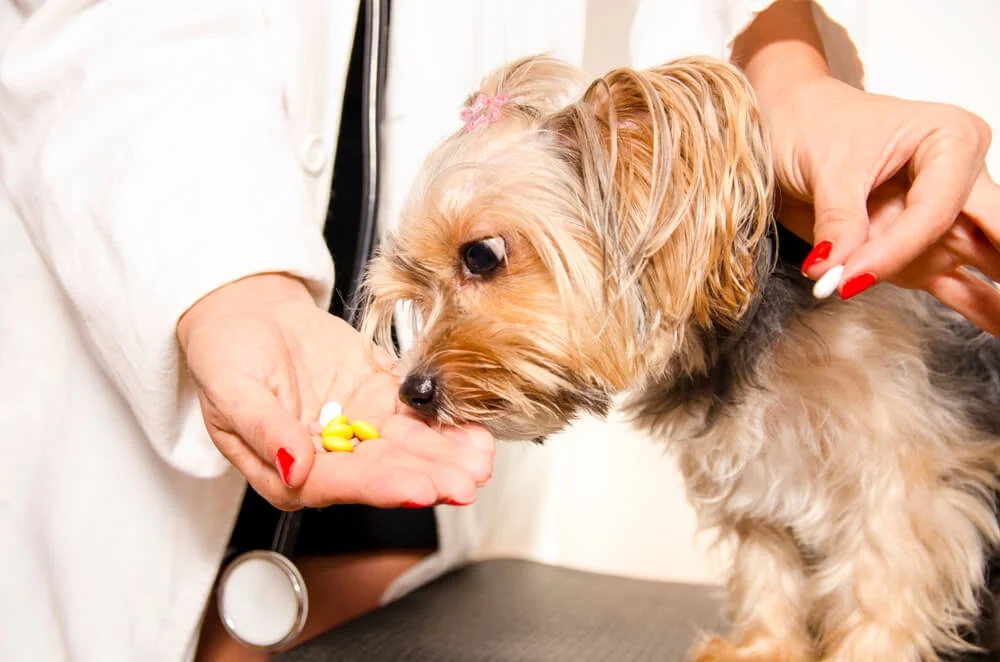
All dogs can suffer from stomach problems every now and then but Yorkshire Terriers can be particularly prone. Their small size means that stomach problems should always be taken seriously as they can become sick very quickly. Always consult your veterinarian if you are concerned that your Yorkie is unwell. Let’s take a closer look at Yorkie stomach problems, what causes them, and what you can do to help.
How do I know if my Yorkie has a stomach problem?
Stomach problems in Yorkies can present in many different ways, depending on the cause of the problem and the individual dog. Signs that could indicate that your dog has a stomach problem include:
- Nausea – excessive drooling or frequent lip licking and swallowing
- Vomiting
- Diarrhea
- Constipation
- Regurgitation
- Abdominal discomfort
- A gassy or gurgly stomach
- Flatulence
- Restlessness
- Weight loss
- Lethargy
- Inappetence
A Yorkie with stomach problems might show any number of these signs depending on the severity of the illness.
How are stomach problems in Yorkies diagnosed?

If your Yorkie has diarrhea that isn’t resolving or keeps returning, your veterinarian might suggest sending a stool sample to the laboratory to look for an underlying cause.
Your veterinarian will ask you detailed questions about your Yorkie’s history, including whether or not they have eaten anything out of the ordinary recently, how long the problem has been occurring, and whether or not your Yorkie has experienced similar problems in the past.
If the veterinarian is concerned that your Yorkie is very unwell or that they have an underlying illness, they might suggest further tests such as blood tests, urinalysis, an ultrasound scan, or an x-ray. If your dog has diarrhea that isn’t resolving or keeps returning, your veterinarian might suggest sending a stool sample to the laboratory to look for an underlying cause.
What causes stomach problems in Yorkies?
There are a large number of potential causes of stomach problems in Yorkies. They can be caused by anything that upsets the balance of the normal microorganisms (such as bacteria and protozoa) within a dog’s intestinal tract – known as the microbiome or ‘good bacteria’. Things that can cause an alteration in a dog’s microbiome include:
- Dietary indiscretion – when a dog eats things they shouldn’t, such as rotten food, non-food items, or human food that is not designed for dogs.
- Intestinal parasites – such as roundworm, or giardia
- Viruses – such as parvovirus or rotavirus
- Bacterial infections – such as salmonella, campylobacter, or E. coli
- Stress
- Intestinal obstruction – usually caused by a dog eating a non-food object such as a toy or sock
- Toxin ingestion – such as a poisonous plant or chemical
- Pancreatitis – a painful condition that can occur in any breed, although Yorkshire Terriers are more predisposed than some.
- Cancers of the gastrointestinal tract
- Other underlying illnesses – such as liver disease
Often, the cause is unknown, especially when the condition clears up quickly on its own without the need for further tests.
How are stomach problems in Yorkies treated?

Probiotics and prebiotics are often recommended to help restore the balance of your dog’s microbiome and therefore help alleviate symptoms.
The treatment of stomach problems will depend on the cause. For a one-off bout of vomiting and/or diarrhea, the main treatment is usually supportive care. The type and level of treatment your dog will require depends on how sick they are. If they are generally well, and their symptoms only recently started, they can probably be treated with medications as an outpatient.
If your Yorkie is vomiting, your veterinarian might give them an anti-emetic (anti-sickness) injection which can help to prevent nausea as well as vomiting. Probiotics (beneficial bacteria) and prebiotics (food for the beneficial bacteria) are often recommended to help restore the balance of your dog’s microbiome and therefore help alleviate symptoms.
Dogs with severe stomach problems might stop drinking because they feel too poorly and can quickly become dehydrated. Dehydration might be worsened through vomiting and/or diarrhea and it can be very serious. If your Yorkie is dehydrated, they might need a stay in the hospital so that they can receive intravenous fluids (a drip) to replace the fluids that they’ve lost.
Other medicines such as gastro-protectants and pain relief might also be needed to help your dog feel better. Antibiotics might be given if your dog has a bacterial infection, or if their symptoms are severe.
The importance of nutrition in Yorkie stomach problems

It’s important to know that Yorkshire Terriers can be prone to food sensitivities and these can manifest as bouts of regular stomach problems.
Your dog’s food is one of the most important factors when considering how best to treat (and prevent) stomach problems. If your Yorkie is suffering from a one-off bout of vomiting and/or diarrhea, your veterinarian will usually recommend feeding small, frequent meals of highly digestible food.
Yorkshire Terriers can be prone to food sensitivities and these can manifest as bouts of regular stomach problems. It can often help to feed limited ingredient dog food to make it easier to eliminate any food ingredients that might be contributing to recurrent problems and help prevent future episodes.
Yorkies are often picky eaters and so choosing a diet that is not only suitable but also appealing can sometimes be a challenge! Dog foods that are gently cooked and have a small number of ingredients are often more appetizing as they retain flavor and there are fewer ingredients for your dog to take a dislike to!
Frequently Asked Questions
What causes a Yorkie to throw up?
There are lots of things that could cause a Yorkie to throw up, including dietary indiscretion, infection, food sensitivity or allergy, stress, pancreatitis, or other illness. A one-off episode of vomiting probably isn’t too much to worry about but take your Yorkie to the vet if you are concerned that he is sick.
What can you give a Yorkie for an upset stomach?
The best thing to feed your Yorkie for an upset stomach are small meals of a bland diet. Probiotics and prebiotics can also sometimes help a stomach upset get better.
What Yorkies should not eat?
There are many things that any dog, including Yorkies, should not eat. Some foods such as grapes, chocolate, or onions can be very dangerous for your pet. Always check with your veterinarian if you are unsure whether something is safe to feed your dog.
Is it common for Yorkies to have stomach issues?
Yorkies can be more prone than some other breeds to having stomach issues. As a breed, they are more likely to suffer from food sensitivities and pancreatitis, both of which can cause vomiting, amongst other stomach problems.



